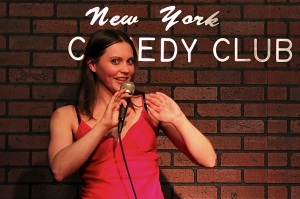
Several years ago, I was driving through the backwoods of central Florida trying to find the home of a distant cousin. Desperately lost, I called my mother, but my abuela answered the phone.
I asked her, “Hey, do you know Annita’s phone number? I’m trying to find her house.”
My grandmother’s response: “Go home. A woman shouldn’t be driving alone.”
I can’t help but feel my grandmother’s Old World values have a residual grasp on modern society — the notion that a woman’s role is in the private sphere, that she should not be out in public.
Often while walking the streets of Manhattan I’m subjected to stares that deem me guilty of a crime: guilty of walking with ovaries.
I think most women can relate to this feeling, being gawked at and approached by men. I don’t think these comments come from sincere good intentions; they come from a desire to control, to make a woman feel vulnerable, like a tiny subliminal voice is saying “this is what happens when a woman is out in public, if you don’t want to be treated like meat, stay indoors.”
Given those two options, I’ll brush up on my get-losts and continue on my way.
Is a woman in public there for the taking? Is she unclaimed property just waiting for someone to usher her indoors? I can’t help but feel that the simple act of being alone in public carries the connotation of whore — someone asking for trouble. After all, that’s why the buddy system exists.
This is a deep-rooted cultural issue, so inherent we almost don’t notice it. From the moment I was born a woman, I’ve been told to be afraid, to be careful, don’t go out alone. Well, as an independent woman, I have to go outdoors. I don’t want to live in a society where women play no public role (like our Arab buddies.) When a few jerks push, for better or worse, we women have to push back (real men like that.)
A few weeks back I was watching MSNBC’s Chris Hayes talk about the treatment of women in the media. Prominent public women are often the focus of objectification and verbal attacks (usually on their appearance, such as Ashley Judd.) I know anyone in a mainstream public position is vulnerable to attack, but I feel the treatment of women in media stems from the same idea — women should be in the private sphere, influencing culture from “behind the scenes,” or else we’ll call YOU puffy face.
The Culture of Viciousness, as one of Hayes’ guests named it, verbally assaults women where physical harm is no longer a threat (of course, both women and men take part in this.) Perhaps, it is a subconscious desire to usher public women back into a private sphere. Or maybe it’s just a simple case of haters gonna hate.
At any rate, I think the idea of “behind every great man, is a greater woman” needs to end. It’s freaking hard though. In the past, women had no other choice than to gain power using the private sphere, not anymore.
However, the more public our face, the more vulnerable we become, and vulnerability is a serious issue to a woman. We are raised to avoid those situations that make us vulnerable at all cost, so it’s almost counter intuitive to aim for public prominence. It’s nearly crazy.
As a comedian, I bare a double-edged sword of vulnerability — being in public and opening my soul. Eek! I’m not surprised the stand-up scene is male dominated.
Women don’t need to get on stage for attention. We can just walk down the street in a miniskirt.
However, I feel it’s important for women to influence all aspects of culture. I choose to live by example and take control of my public image.
It’s hard.
Peru-born Elise Roendenbeck blogs here. A stand-up comic by night and professional geek by day, Elise is a slut authority.
